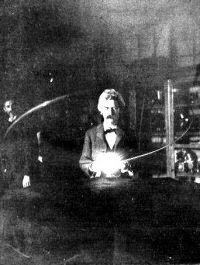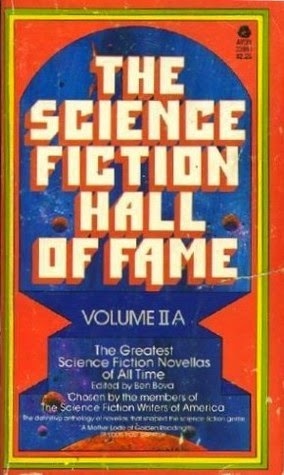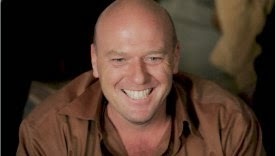Ted Rabinowitz's Blog, page 18
January 9, 2015
"I Do Not Agree With What You Say-"
 "-But I Will Defend to the Death Your Right to Say It."
"-But I Will Defend to the Death Your Right to Say It."This week, this line seems particularly apt. It's frequently attributed to François-Marie Arouet, or Voltaire, one of the founders of the French Enlightenment. As it turns out, Voltaire never said it himself; his biographer, Evelyn Beatrice Hall, wrote it as a summation of Voltaire's beliefs.
Either way, I agree with that sentiment; and I loathe those who claim the right to shut people up with violence and threats.
Perhaps it's time we staged a Voltaire-a-thon.
Published on January 09, 2015 12:09
January 8, 2015
Bone Marrow Donation: Scary No More!
If you've heard about BMD, it's likely included stories about giant needles, general anesthesia, and pain that lingers for weeks.
Apparently, that's not true anymore.
So don't be afraid to be a donor!
Apparently, that's not true anymore.
So don't be afraid to be a donor!
Published on January 08, 2015 19:44
January 7, 2015
Disco Clam
 Disco Clam - aka Ctenoides ales, aka the Electric Flame Scallop - has tiny, shiny bits of silica in its mantle that shine and flash brightly in sunlight or the artificial lights of divers. Boogie down, baby! Boogie down!
Disco Clam - aka Ctenoides ales, aka the Electric Flame Scallop - has tiny, shiny bits of silica in its mantle that shine and flash brightly in sunlight or the artificial lights of divers. Boogie down, baby! Boogie down!Burn, baby, burn - disco inferno...
Published on January 07, 2015 10:15
January 5, 2015
Can It Be True? Shall "Babylon 5" Return to Us?
 Well, that's the word from Blastr.com, anyway. Seems that J. Michael is working on a movie screenplay; it will be a "reboot," not a continuation of the series. He hopes to use some of the same cast members.
Well, that's the word from Blastr.com, anyway. Seems that J. Michael is working on a movie screenplay; it will be a "reboot," not a continuation of the series. He hopes to use some of the same cast members.
Published on January 05, 2015 19:07
Medieval Recipe Day - Merry Twelfth Night
January 5 is Twelfth Night, the Eve of the Epiphany. It commemorates the Adoration of the Magi (or kings). It marks the end of the Christmas season and was a big deal in Medieval Europe. One of the traditions was (and still is) baking a "king's cake" or galette du roi. The cake is ring-shaped, to represent a crown; and small items are baked inside it, like coins, rings, and a bean. If someone finds a coin, it signifies wealth; a ring, marriage; and whoever finds the bean becomes the king of the feast, the Bean King. Tolkien wrote a novella around the king's cake called Smith of Wootton Major. And here's a recipe for it (the cake, not the story), from Elizabeth Bissette at BellaOnline:
Kings Cake
2 envelopes active dry yeast
1/2 c granulated sugar
1/4 pd (1 stick) unsalted butter, melted
1/2 c warm milk
5 large egg yolks, room temperature
4 1/2 c all-purpose flour
2 tsp. salt
1 tsp. freshly grated nutmeg
1 tsp. grated lemon peel
1 tsp. vegetable oil
1 pound cream cheese, room temperature
4 c confectioner's sugar
1 bean, 1 ring, 1 coin
5 tbsp. milk, room temperature
3 tbsp. lemon juice
Purple, green andd gold or yellow srinkles
Combine yeast and granulated sugar in bowl of mixer. Add melted butter and warm milk. Beat at low speed 1 min. With the mixer running, add egg yolks, then beat for 1 minute at medium-low. Add flour, salt, nutmeg, and lemon peel, beat until well mixed. Increase speed to high and beat until the dough pulls away from sides of the bowl & forms a ball. Remove dough, form into smooth ball. Lightly oil a bowl with vegetable oil. Place dough in the bowl and turn to oil all sides. Cover with plastic wrap and set aside in a warm, draft-free place until doubled, (about 2 hours).
Make filling: combine the cream cheese and 1 c confectioner's sugar. Blend. Set aside.Line a baking sheet with parchment paper.
Turn dough out onto a lightly floured board, pat into rectangle about 30 in. long and 6 in. wide.
Spread filling over the bottom half of the dough, flip the top half of the dough over the filling. Seal the edges, pinching together. Shape into a cylinder and place on prepared baking sheet seam side down. Shape into a ring and pinch the ends together so there isn't a seam. Insert objects into the ring from the bottom so they're completely hidden.
Cover and place in a warm, draft-free place. Let rise until doubled in size, about 45 minutes. Preheat the oven to 350°F.
Brush top with 2 tablespoons of milk. Bake until golden brown, 25 to 30 minutes. Remove and let cool completely.
Make icing by combining remaining 3 tablespoons milk, lemon juice, and 3 c confectioner's sugar. Stir to blend well. With a rubber spatula, spread evenly over the top of the cake. Add sprinkles, alternating colors around the cake.
Traditionally cut into 2-inch-thick slices with all guests present.
Kings Cake
2 envelopes active dry yeast
1/2 c granulated sugar
1/4 pd (1 stick) unsalted butter, melted
1/2 c warm milk
5 large egg yolks, room temperature
4 1/2 c all-purpose flour
2 tsp. salt
1 tsp. freshly grated nutmeg
1 tsp. grated lemon peel
1 tsp. vegetable oil
1 pound cream cheese, room temperature
4 c confectioner's sugar
1 bean, 1 ring, 1 coin
5 tbsp. milk, room temperature
3 tbsp. lemon juice
Purple, green andd gold or yellow srinkles
Combine yeast and granulated sugar in bowl of mixer. Add melted butter and warm milk. Beat at low speed 1 min. With the mixer running, add egg yolks, then beat for 1 minute at medium-low. Add flour, salt, nutmeg, and lemon peel, beat until well mixed. Increase speed to high and beat until the dough pulls away from sides of the bowl & forms a ball. Remove dough, form into smooth ball. Lightly oil a bowl with vegetable oil. Place dough in the bowl and turn to oil all sides. Cover with plastic wrap and set aside in a warm, draft-free place until doubled, (about 2 hours).
Make filling: combine the cream cheese and 1 c confectioner's sugar. Blend. Set aside.Line a baking sheet with parchment paper.
Turn dough out onto a lightly floured board, pat into rectangle about 30 in. long and 6 in. wide.
Spread filling over the bottom half of the dough, flip the top half of the dough over the filling. Seal the edges, pinching together. Shape into a cylinder and place on prepared baking sheet seam side down. Shape into a ring and pinch the ends together so there isn't a seam. Insert objects into the ring from the bottom so they're completely hidden.
Cover and place in a warm, draft-free place. Let rise until doubled in size, about 45 minutes. Preheat the oven to 350°F.
Brush top with 2 tablespoons of milk. Bake until golden brown, 25 to 30 minutes. Remove and let cool completely.
Make icing by combining remaining 3 tablespoons milk, lemon juice, and 3 c confectioner's sugar. Stir to blend well. With a rubber spatula, spread evenly over the top of the cake. Add sprinkles, alternating colors around the cake.
Traditionally cut into 2-inch-thick slices with all guests present.
Published on January 05, 2015 07:46
January 1, 2015
Thought for the First Day of the New Year
Seize the day, or the day shall surely seize you.
Published on January 01, 2015 08:51
December 30, 2014
Music of Sumer, Akkad and Points East
 So a British musician has tried to recreate - or used as an inspiration - music of Ancient Sumer. Ur of the Chaldees rockin' the house...
So a British musician has tried to recreate - or used as an inspiration - music of Ancient Sumer. Ur of the Chaldees rockin' the house...
Published on December 30, 2014 19:31
December 25, 2014
And Hanukkah Is Pretty Damned Cool
Published on December 25, 2014 17:26
December 24, 2014
Three Simple Ways to Build Human Capital at the Syfy Channel
So. Human capital.
 In my last post, I busted Syfy's ass for not having enough human capital - writers/execs who understood both the science and the habits of thought needed to create good science fiction. But the truth is, developing human capital in science fiction isn't easy. [NB - I was going to put a photo of one of Syfy's major content VPs here, but it was a professional headshot, and the guy STILL looked like a complete douche. It would have been unfair, so instead, you get a pic of the beautiful Andromeda galaxy...with which we're going to collide in just four billion years. Enjoy!]
In my last post, I busted Syfy's ass for not having enough human capital - writers/execs who understood both the science and the habits of thought needed to create good science fiction. But the truth is, developing human capital in science fiction isn't easy. [NB - I was going to put a photo of one of Syfy's major content VPs here, but it was a professional headshot, and the guy STILL looked like a complete douche. It would have been unfair, so instead, you get a pic of the beautiful Andromeda galaxy...with which we're going to collide in just four billion years. Enjoy!]
A good science fiction writer is someone who can ask a significant "What If." What if we develop a technology that's mind-shatteringly dangerous, but also economically crucial? What if people live to be 180 years old...but only a few of them, and only because of family genetics? What if old age is actually a crucial stage in human evolution? In other words, What if the conditions of the world become different - how would we respond?
To ask that question, and then answer it in a way that's both believable and interesting, you have to be both a good writer and a good...futurist? Epistemologist? Intellectual? Scientist? Sophist? Someone who likes to play with ideas, and understands that play involves rules - in this case, the rules of logic and probability. Finding someone who is both isn't easy.
 Conditions in the U.S. after World War I helped to promote the What If writer in a way that has never occurred before or since. America had an entrepreneurial culture that encouraged inventors and tinkerers. The Great War, the Jazz Age, and an influx of European refugees in the '30s helped to break down American insularity and exposed potential writers to different ways of life. Individual scientists and engineers (Edison, Tesla, Morse, Olds, Ford, Hollerith, Cooper Hewitt, Gillette, etc.)
Conditions in the U.S. after World War I helped to promote the What If writer in a way that has never occurred before or since. America had an entrepreneurial culture that encouraged inventors and tinkerers. The Great War, the Jazz Age, and an influx of European refugees in the '30s helped to break down American insularity and exposed potential writers to different ways of life. Individual scientists and engineers (Edison, Tesla, Morse, Olds, Ford, Hollerith, Cooper Hewitt, Gillette, etc.)
could make significant advances and carry on important experiments without billion-dollar outlays. It was easier to bridge CP Snow's "two cultures" - the sciences and the humanities. Finally, a writer could make a living (albeit not a tremendous one) on short-story sales alone - which made the pulp magazines superb incubators for story-telling talent. Those magazines also had writer/editors like John W. Campbell, who understood what the genre needed to flower.
A lot of those conditions have vanished or mutated. There aren't a lot of successful lone wolf engineers these days; team play is the norm in the sciences, and the mindset required for working on a subset of a subproject dictated by the long-range budget of a multinational corporation doesn't necessarily lend itself to serious lucid dreaming. You can't support yourself by writing short stories anymore (to say the least). While the Internet has opened up lines of communication where there weren't any before, it's also taken space that used to belong to the old-fashioned bull session; sitting in a room swapping ideas with other science junkies face to face has a productive aspect that a chatroom can't match. Finally, the fan society that has shaped and supported science fiction for so long has changed. It's less about science and more about SFX. "Media" cons that focus on comics, cosplay and video games are big money-making enterprises; gatherings that focus more on actual science are smaller and harder to find.
Given all this, it might be a little unfair to expect Syfy to recreate the socio-economic conditions of mid-century America. But there are things the executives *could* do, if they were motivated. Wouldn't take much time or money, either.
 1. Develop a reading list for your executives. Every Syfy employee with story input should have a basic grounding in the genre. You don't have to read Einstein's Relativity, but you should know that there are important SF authors in addition to Heinlein, Clarke and Asimov. (Hell, I've even GOT a reading list for you, broken down by subject. But you'll have to contact me directly. And it'll cost you.)
1. Develop a reading list for your executives. Every Syfy employee with story input should have a basic grounding in the genre. You don't have to read Einstein's Relativity, but you should know that there are important SF authors in addition to Heinlein, Clarke and Asimov. (Hell, I've even GOT a reading list for you, broken down by subject. But you'll have to contact me directly. And it'll cost you.)
 2. Develop relationships with F/SF editors and magazines. They may not know much about TV production, but they know story. F/SF story. It's their job. Talk to the people at Tor.com, Fantasy & Science Fiction, Asimov's. Get to know them.
2. Develop relationships with F/SF editors and magazines. They may not know much about TV production, but they know story. F/SF story. It's their job. Talk to the people at Tor.com, Fantasy & Science Fiction, Asimov's. Get to know them.
3. Spend some time with scientists. They're nice people. Trust me. You missed your shot with Neil DeGrasse Tyson and Bill Nye (they don't need you anymore) but how about Andre Geim, the guy who first synthesized graphene in the lab? He's a Nobel winner, and he's got a sick sense of humor. (Levitating frog, anyone?) Why is it that WWE is still on Syfy, but TED isn't?
C'mon guys.
It ain't rocket science.
 In my last post, I busted Syfy's ass for not having enough human capital - writers/execs who understood both the science and the habits of thought needed to create good science fiction. But the truth is, developing human capital in science fiction isn't easy. [NB - I was going to put a photo of one of Syfy's major content VPs here, but it was a professional headshot, and the guy STILL looked like a complete douche. It would have been unfair, so instead, you get a pic of the beautiful Andromeda galaxy...with which we're going to collide in just four billion years. Enjoy!]
In my last post, I busted Syfy's ass for not having enough human capital - writers/execs who understood both the science and the habits of thought needed to create good science fiction. But the truth is, developing human capital in science fiction isn't easy. [NB - I was going to put a photo of one of Syfy's major content VPs here, but it was a professional headshot, and the guy STILL looked like a complete douche. It would have been unfair, so instead, you get a pic of the beautiful Andromeda galaxy...with which we're going to collide in just four billion years. Enjoy!]A good science fiction writer is someone who can ask a significant "What If." What if we develop a technology that's mind-shatteringly dangerous, but also economically crucial? What if people live to be 180 years old...but only a few of them, and only because of family genetics? What if old age is actually a crucial stage in human evolution? In other words, What if the conditions of the world become different - how would we respond?
To ask that question, and then answer it in a way that's both believable and interesting, you have to be both a good writer and a good...futurist? Epistemologist? Intellectual? Scientist? Sophist? Someone who likes to play with ideas, and understands that play involves rules - in this case, the rules of logic and probability. Finding someone who is both isn't easy.
 Conditions in the U.S. after World War I helped to promote the What If writer in a way that has never occurred before or since. America had an entrepreneurial culture that encouraged inventors and tinkerers. The Great War, the Jazz Age, and an influx of European refugees in the '30s helped to break down American insularity and exposed potential writers to different ways of life. Individual scientists and engineers (Edison, Tesla, Morse, Olds, Ford, Hollerith, Cooper Hewitt, Gillette, etc.)
Conditions in the U.S. after World War I helped to promote the What If writer in a way that has never occurred before or since. America had an entrepreneurial culture that encouraged inventors and tinkerers. The Great War, the Jazz Age, and an influx of European refugees in the '30s helped to break down American insularity and exposed potential writers to different ways of life. Individual scientists and engineers (Edison, Tesla, Morse, Olds, Ford, Hollerith, Cooper Hewitt, Gillette, etc.)could make significant advances and carry on important experiments without billion-dollar outlays. It was easier to bridge CP Snow's "two cultures" - the sciences and the humanities. Finally, a writer could make a living (albeit not a tremendous one) on short-story sales alone - which made the pulp magazines superb incubators for story-telling talent. Those magazines also had writer/editors like John W. Campbell, who understood what the genre needed to flower.
A lot of those conditions have vanished or mutated. There aren't a lot of successful lone wolf engineers these days; team play is the norm in the sciences, and the mindset required for working on a subset of a subproject dictated by the long-range budget of a multinational corporation doesn't necessarily lend itself to serious lucid dreaming. You can't support yourself by writing short stories anymore (to say the least). While the Internet has opened up lines of communication where there weren't any before, it's also taken space that used to belong to the old-fashioned bull session; sitting in a room swapping ideas with other science junkies face to face has a productive aspect that a chatroom can't match. Finally, the fan society that has shaped and supported science fiction for so long has changed. It's less about science and more about SFX. "Media" cons that focus on comics, cosplay and video games are big money-making enterprises; gatherings that focus more on actual science are smaller and harder to find.
Given all this, it might be a little unfair to expect Syfy to recreate the socio-economic conditions of mid-century America. But there are things the executives *could* do, if they were motivated. Wouldn't take much time or money, either.
 1. Develop a reading list for your executives. Every Syfy employee with story input should have a basic grounding in the genre. You don't have to read Einstein's Relativity, but you should know that there are important SF authors in addition to Heinlein, Clarke and Asimov. (Hell, I've even GOT a reading list for you, broken down by subject. But you'll have to contact me directly. And it'll cost you.)
1. Develop a reading list for your executives. Every Syfy employee with story input should have a basic grounding in the genre. You don't have to read Einstein's Relativity, but you should know that there are important SF authors in addition to Heinlein, Clarke and Asimov. (Hell, I've even GOT a reading list for you, broken down by subject. But you'll have to contact me directly. And it'll cost you.) 2. Develop relationships with F/SF editors and magazines. They may not know much about TV production, but they know story. F/SF story. It's their job. Talk to the people at Tor.com, Fantasy & Science Fiction, Asimov's. Get to know them.
2. Develop relationships with F/SF editors and magazines. They may not know much about TV production, but they know story. F/SF story. It's their job. Talk to the people at Tor.com, Fantasy & Science Fiction, Asimov's. Get to know them.3. Spend some time with scientists. They're nice people. Trust me. You missed your shot with Neil DeGrasse Tyson and Bill Nye (they don't need you anymore) but how about Andre Geim, the guy who first synthesized graphene in the lab? He's a Nobel winner, and he's got a sick sense of humor. (Levitating frog, anyone?) Why is it that WWE is still on Syfy, but TED isn't?
C'mon guys.
It ain't rocket science.
Published on December 24, 2014 12:45
December 22, 2014
The Syfy Channel, Real Science Fiction, and Human Capital
Sharknado isn't science fiction, and neither is Syfy.
 That's why the Science Fiction Channel changed its name to Syfy in 2009 - so that it could walk away from a commitment to the genre, and instead program low-grade monster movies, WWE wrestling and reality shows where Tracy Morgan tries make people wet their pants.
That's why the Science Fiction Channel changed its name to Syfy in 2009 - so that it could walk away from a commitment to the genre, and instead program low-grade monster movies, WWE wrestling and reality shows where Tracy Morgan tries make people wet their pants.
Now that they've become a textbook case of Fail, they're trying to walk it back. They've started production on The Expanse; they've shot Ascension; they're mounting series like Defiance. Lots of spaceships and aliens. It's possible - just barely - that they even understand just why so many science fiction fans were so offended by their rebranding.
But there's a problem: The people running Syfy aren't fans, they're TV execs. They know a lot about the complicated craft of creating stories for television, but they don't realize that creating science fiction stories that are compelling, surprising, and logical is just as complicated - and wildly different.
To write a teleplay, you must understand teasers and trailers, buttons and turning points, act breaks and character arcs; but to write a science fiction story that's worth a damn, you must understand not only your premise, but all the prior art that has come before it. You have to understand why it makes good engineering sense to hollow out a cylinder and spin it for gravity, as opposed to inventing a mythical artificial gravity device; you have to know what happens not just what might happen at speeds faster than light, but what we know actually does happen as you approach that speed; the Fermi Paradox, the fossil record, the real limits of time dilation (as opposed to time travel) - you should be familiar with all of it, and how it works. You should understand just how ridiculous it is that separately evolved races might find one another attractive. You should also understand that gimmes and handwaving aren't gifts given to you be the Science Fiction deities; they're necessary evils to be used as sparingly as possible. In short, writing good science fiction demands what executives call human capital - workers with both the intelligence and the education to get the job done. And that is one thing that Syfy lacks.
 What Amos might look like in Leviathan WakesSo far, they've tried to fill the gap by either purchasing successful properties (The Expanse) or hiring showrunners (writer/creators) who have good SF track records, like Ron Moore (Deep Space Nine, Battlestar Galactica). There are a few problems with that strategy. The first is that some of their showrunners are well-known, but not well-liked. (I won't name names, but the man behind one of their most disappointing hard SF series is a good example.) The second is that if you don't have the internal human capital to get SF right, no book, no matter how successful, will survive your attempts to translate it to the screen. (The fact that all the characters in The Expanse will be played by actors who are yards prettier and years younger than their literary counterparts is a disturbing sign.)
What Amos might look like in Leviathan WakesSo far, they've tried to fill the gap by either purchasing successful properties (The Expanse) or hiring showrunners (writer/creators) who have good SF track records, like Ron Moore (Deep Space Nine, Battlestar Galactica). There are a few problems with that strategy. The first is that some of their showrunners are well-known, but not well-liked. (I won't name names, but the man behind one of their most disappointing hard SF series is a good example.) The second is that if you don't have the internal human capital to get SF right, no book, no matter how successful, will survive your attempts to translate it to the screen. (The fact that all the characters in The Expanse will be played by actors who are yards prettier and years younger than their literary counterparts is a disturbing sign.)
 What he looks like in Syfy's The Expanse
What he looks like in Syfy's The Expanse
So what's a well-intentioned TV exec to do? Assuming that there is such a creature, of course - assuming that Syfy's rebranders have actually learned their lesson, and don't just regard this as one more recalibration of a content and entertainment provider - they could do what Gene Roddenberry and Rod Serling did all those years ago, and hire some actual SF writers along with their screenwriting cronies. Roddenberry hired writers of classic SF - Theodore Sturgeon, Harlan Ellison, Jerome Bixby, Richard Matheson, Robert Bloch, and Norman Spinrad, among others - to help create the stories of Star Trek. He reached beyond Hollywood's intellectual kiddie pool to get the writers who had been playing with these ideas for years. Sure, some of the stories had to be reworked...like, massively...to make it onto the screen. But that outreach also generated some of the series' most enduring episodes: The City on the Edge of Forever; Amok Time; Arena...
After all this time, after LoTR and Iron Man and Star Wars, it's still the printed word where the really wild shit happens. That's where the hard thinking takes place, and the disturbing, clever, tough-to-shake ideas first enter the world.
Your move, Syfy.
 That's why the Science Fiction Channel changed its name to Syfy in 2009 - so that it could walk away from a commitment to the genre, and instead program low-grade monster movies, WWE wrestling and reality shows where Tracy Morgan tries make people wet their pants.
That's why the Science Fiction Channel changed its name to Syfy in 2009 - so that it could walk away from a commitment to the genre, and instead program low-grade monster movies, WWE wrestling and reality shows where Tracy Morgan tries make people wet their pants.Now that they've become a textbook case of Fail, they're trying to walk it back. They've started production on The Expanse; they've shot Ascension; they're mounting series like Defiance. Lots of spaceships and aliens. It's possible - just barely - that they even understand just why so many science fiction fans were so offended by their rebranding.
But there's a problem: The people running Syfy aren't fans, they're TV execs. They know a lot about the complicated craft of creating stories for television, but they don't realize that creating science fiction stories that are compelling, surprising, and logical is just as complicated - and wildly different.
To write a teleplay, you must understand teasers and trailers, buttons and turning points, act breaks and character arcs; but to write a science fiction story that's worth a damn, you must understand not only your premise, but all the prior art that has come before it. You have to understand why it makes good engineering sense to hollow out a cylinder and spin it for gravity, as opposed to inventing a mythical artificial gravity device; you have to know what happens not just what might happen at speeds faster than light, but what we know actually does happen as you approach that speed; the Fermi Paradox, the fossil record, the real limits of time dilation (as opposed to time travel) - you should be familiar with all of it, and how it works. You should understand just how ridiculous it is that separately evolved races might find one another attractive. You should also understand that gimmes and handwaving aren't gifts given to you be the Science Fiction deities; they're necessary evils to be used as sparingly as possible. In short, writing good science fiction demands what executives call human capital - workers with both the intelligence and the education to get the job done. And that is one thing that Syfy lacks.
 What Amos might look like in Leviathan WakesSo far, they've tried to fill the gap by either purchasing successful properties (The Expanse) or hiring showrunners (writer/creators) who have good SF track records, like Ron Moore (Deep Space Nine, Battlestar Galactica). There are a few problems with that strategy. The first is that some of their showrunners are well-known, but not well-liked. (I won't name names, but the man behind one of their most disappointing hard SF series is a good example.) The second is that if you don't have the internal human capital to get SF right, no book, no matter how successful, will survive your attempts to translate it to the screen. (The fact that all the characters in The Expanse will be played by actors who are yards prettier and years younger than their literary counterparts is a disturbing sign.)
What Amos might look like in Leviathan WakesSo far, they've tried to fill the gap by either purchasing successful properties (The Expanse) or hiring showrunners (writer/creators) who have good SF track records, like Ron Moore (Deep Space Nine, Battlestar Galactica). There are a few problems with that strategy. The first is that some of their showrunners are well-known, but not well-liked. (I won't name names, but the man behind one of their most disappointing hard SF series is a good example.) The second is that if you don't have the internal human capital to get SF right, no book, no matter how successful, will survive your attempts to translate it to the screen. (The fact that all the characters in The Expanse will be played by actors who are yards prettier and years younger than their literary counterparts is a disturbing sign.) What he looks like in Syfy's The Expanse
What he looks like in Syfy's The ExpanseSo what's a well-intentioned TV exec to do? Assuming that there is such a creature, of course - assuming that Syfy's rebranders have actually learned their lesson, and don't just regard this as one more recalibration of a content and entertainment provider - they could do what Gene Roddenberry and Rod Serling did all those years ago, and hire some actual SF writers along with their screenwriting cronies. Roddenberry hired writers of classic SF - Theodore Sturgeon, Harlan Ellison, Jerome Bixby, Richard Matheson, Robert Bloch, and Norman Spinrad, among others - to help create the stories of Star Trek. He reached beyond Hollywood's intellectual kiddie pool to get the writers who had been playing with these ideas for years. Sure, some of the stories had to be reworked...like, massively...to make it onto the screen. But that outreach also generated some of the series' most enduring episodes: The City on the Edge of Forever; Amok Time; Arena...
After all this time, after LoTR and Iron Man and Star Wars, it's still the printed word where the really wild shit happens. That's where the hard thinking takes place, and the disturbing, clever, tough-to-shake ideas first enter the world.
Your move, Syfy.
Published on December 22, 2014 18:13




